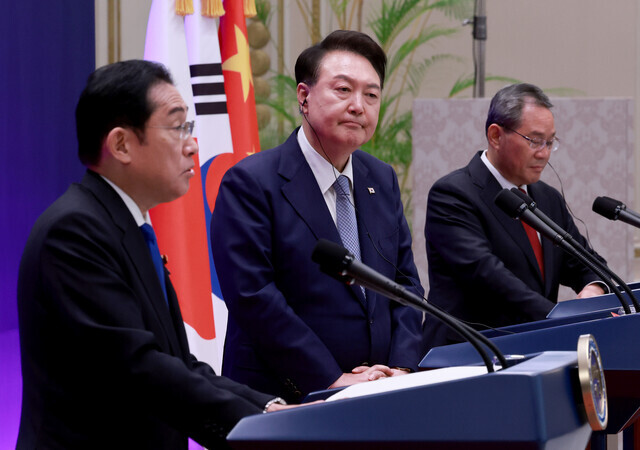hankyoreh
Links to other country sites 다른 나라 사이트 링크
S. Korea, Japan, China commit to regular talks, speeding up FTA negotiations

South Korea, China and Japan have agreed to meet regularly for summit-level talks. The three nations also agreed to strengthen cooperation in various fields, including economy and trade, by continuing discussions to speed up negotiations on a trilateral free trade agreement.
However, the issue of denuclearization of the Korean Peninsula did not make it into the leaders’ joint declaration, with only a generic reaffirmation that “maintaining peace, stability and prosperity on the Korean Peninsula and in Northeast Asia serves our common interest, and is our common responsibility,” taking its place.
South Korean President Yoon Suk-yeol, Chinese Premier Li Qiang and Japanese Prime Minister Fumio Kishida took part in a trilateral summit at the Blue House’s state guest house in Seoul on Monday morning. The summit lasted for 90 minutes, and was followed by a joint press conference and the adoption of their joint declaration.
This marked the ninth trilateral summit among the three nations, the last time the three gathered and issued a joint statement being in December 2019, in Chengdu, China.
In the joint statement after Monday’s summit, the three leaders said they shared the view that their summit “carries valuable meaning for revitalizing the trilateral cooperation,” and reaffirmed the need to hold trilateral summits and talks between their respective foreign ministers on a regular basis “in order to further advance the trilateral cooperation.” The leaders also stated that they would “make efforts to ensure that peoples of the three countries can enjoy substantive benefits emanating from this cooperation.”
The three countries agreed to identify and implement mutually beneficial cooperation projects in six key areas: people-to-people exchanges; sustainable development through responses to climate change; economic cooperation and trade; public health and aging society issues; science, technology and digital transformation; and disaster relief and safety.
When it comes to the economy and trade, the clause “we will keep discussions for speeding up negotiations for a Trilateral FTA” stuck out in particular.
Negotiations for a trilateral FTA between China, Japan and South Korea began in November 2012, but have not made much progress. The growing importance of intellectual property prompted the three countries to adopt a joint statement on a 10-year vision for trilateral IP cooperation on the occasion of Monday’s summit.
Many were interested to see what sort of agreement the three nations would reach on the North Korea nuclear weapons issue, but the countries seemed unable to reconcile on the issue. In the joint declaration, the three countries emphasized that they “reiterated positions on regional peace and stability, denuclearization of the Korean Peninsula and the abductions issue, respectively,” while agreeing to continue to “make positive efforts for the political settlement of the Korean Peninsula issue.”
The joint statement released after the trilateral summit in 2019 included the sentence, “We are committed to the complete denuclearization of the Korean Peninsula,” but at this most recent summit, the leaders were apparently unable to narrow their differences.
These disparities in tone were also noticeable during the joint press meeting held after the summit.
While Yoon and Kishida underscored the importance of working toward denuclearization of North Korea as a common interest for the three countries, Li did not explicitly mention North Korea in the press conference, saying only that China remains committed to promoting peace and stability on the Korean Peninsula and to pushing for a political resolution for the Korean Peninsula issue.
Li went on to say that China believes that the relevant parties should maintain restraint and prevent the situation from further deterioration and complications.
The three leaders concluded the summit by promising to hold the next summit in Japan.
By Lee Seung-jun, staff reporter
Please direct questions or comments to [english@hani.co.kr]

Editorial・opinion
![[Column] How tragedy pervades weak links in Korean labor [Column] How tragedy pervades weak links in Korean labor](https://flexible.img.hani.co.kr/flexible/normal/500/300/imgdb/original/2024/0703/8717199957128458.jpg) [Column] How tragedy pervades weak links in Korean labor
[Column] How tragedy pervades weak links in Korean labor![[Column] How opposing war became a far-right policy [Column] How opposing war became a far-right policy](https://flexible.img.hani.co.kr/flexible/normal/500/300/imgdb/original/2024/0702/5017199091002075.jpg) [Column] How opposing war became a far-right policy
[Column] How opposing war became a far-right policy- [Editorial] Korea needs to adjust diplomatic course in preparation for a Trump comeback
- [Editorial] Silence won’t save Yoon
- [Column] The miscalculations that started the Korean War mustn’t be repeated
- [Correspondent’s column] China-Europe relations tested once more by EV war
- [Correspondent’s column] Who really created the new ‘axis of evil’?
- [Editorial] Exploiting foreign domestic workers won’t solve Korea’s birth rate problem
- [Column] Kim and Putin’s new world order
- [Editorial] Workplace hazards can be prevented — why weren’t they this time?
Most viewed articles
- 110 days of torture: Korean mental patient’s restraints only removed after death
- 2In the blink of an eye, an unthinkable crash turned a night out into a nightmare
- 3Families, friends mourn loved ones cut down in prime in deadly car crash
- 4[Column] How tragedy pervades weak links in Korean labor
- 5Experts cast doubt on driver’s claim that sudden unintended acceleration caused deadly crash
- 6Democrats seek to impeach 4 prosecutors, including those tied to probes into Lee Jae-myung
- 7KCC chief resigns to avoid impeachment, the second in 7 months
- 8Korea to create dedicated population strategy ministry to combat low birth rate, aging society
- 9More South Koreans, particularly the young, are leaving their religions
- 10Dreams of a better life brought them to Korea — then a tragic fire tore them apart